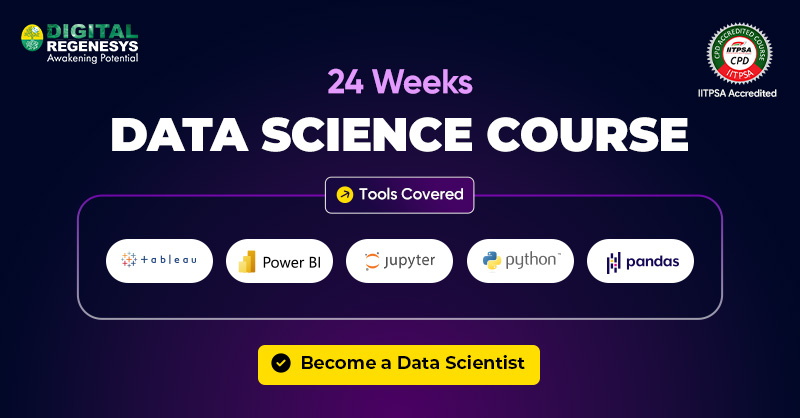What is Data Science?- Know Why It is Important in Business!

What is Data Science?: Data science is the discipline that focuses on managing and analysing large volumes of data through modern tools and techniques. According to IBM, data science is about “uncovering actionable insights hidden in an organisation’s data.” It also includes mathematics, statistics, programming, advanced analytics, artificial intelligence (AI), and machine learning with subject matter expertise. As technology becomes advanced, organisations continuously collect large volumes of data to analyse information. This analysis improves customer service and marketing strategies. It helps businesses remain competitive in a challenging market.
Read the article to learn more about “What is data science all about”?; “What is data science life cycle?” and more.
What is a Data Science Life Cycle?
The data science life cycle refers to the steps taken by a data scientist to solve problems for an organisation. In this process, they use large volumes of data and various analytical tools. Each data science life cycle may vary slightly, but all consist of the same six basic steps. Let us know about these basic steps below.
- Problem Identification: The data science life cycle begins with clearly defining the organisation’s problem and understanding the value of solving it. This step involves determining necessary resources, identifying risks, and aligning stakeholders with the data science team.
- Data Collecting: After identifying the problem, the next step is to collect relevant data from various sources to ensure its quality. Some common data collection methods are surveys, social media monitoring, web scraping, and transactional tracking.
- Data Processing: After collecting the raw data, it needs to be processed to become useful for analysis. This step involves data cleaning, merging datasets, and converting data into appropriate formats.
- Data Exploring: After data processing, the exploration phase focuses on identifying patterns, trends, and biases that inform decision-making. For example, identifying a product’s popularity in a certain area can help to set marketing strategies.
- Data Modelling: After identifying relevant trends, data modelling transforms these insights into visual representations using tools like decision trees and regression techniques. Once validated, these models serve as references for stakeholders to address the initial problem.
- Communicating Findings: The final step involves effectively communicating your findings to stakeholders who may need to become more familiar with data models. This requires translating complex data insights into understandable formats, such as written reports, graphs, and presentations, to facilitate informed decision-making.
Learn Why to study data science here!

Key Components of Data Science
After learning what is a data science life cycle, let us discuss the key components of data science. Data science is a multidisciplinary field that comprises various components essential for extracting valuable insights from data. If you understand these key components properly, it will help you to become competitive in this field. Below are the key components of data science.
- Data engineering: Data engineering ensures efficient data storage and processing. It includes data cleaning to resolve missing values, incorrect types, and inconsistencies, turning raw data into high-quality datasets.
- Statistical Knowledge: Statistics offers data analysis methods to find patterns, trends, and connections. These methods are descriptive and inferential statistics, which help data scientists to make useful conclusions and smart decisions.
- Machine learning Expertise: Machine learning uses algorithms that help systems learn from data without explicit programming. It helps make predictions and automate data analysis for better results.
- Programming Languages (Python, R, SQL): Python, R, and SQL are key languages in data science. Python is used for data manipulation and machine learning, R is used for statistical analysis, and SQL for managing relational databases.
- Understanding of Big Data: Big data refers to large and complex datasets that require advanced tools and techniques for efficient storage, processing, and analysis.
Know the programming language used in Data Science here
Tools & Technologies in Data Science
Before learning about tools & technologies used in data science, you must know “what is data science?” and its basic concepts. Then, it will be much easier for you to understand the use of these tools. These tools & technologies help data scientists extract insights from large datasets, automate repetitive tasks, and develop predictive models. Below are the tools used in data science.
- Python: Python is a programming language widely used in data science for data analysis, machine learning, and automation.
- Pandas: It is a Python library designed for data manipulation and analysis, particularly with structured data like tables.
- Spark NLP: It is a natural language processing library built on Apache Spark that is used for large-scale text analysis.
- GIT: GIT is a version control system that tracks code changes, allowing for efficient collaboration and project management.
- MongoDB (DBMS): It is a NoSQL database that stores data in flexible, JSON-like documents, ideal for handling large unstructured datasets.
- MySQL (DBMS): It is a widely-used relational database management system for structured data, supporting SQL for data querying.
- Power BI: Power B is a business analytics tool by Microsoft used to visualise data and create interactive reports.
- Tableau: It is a powerful data visualisation tool that helps create interactive and shareable dashboards for data insights.
- Excel: Excel is a Microsoft spreadsheet software that is used for data organisation, analysis, and visualisation, as well as functions and pivot tables.
Read More – data science vs machine learning
Why is Data Science Important?
Nearly every sector in the 21st century relies on data to some extent for their workings. As a data scientist, you can assist companies in understanding large volumes of data and provide valuable insights that guide strategic business decisions. Some companies, such as marketing and finance, use data science to increase customer interactions, identify operational patterns, and respond to market demands. Data scientists can solve real-world problems using advanced tools and machine-learning techniques. Moreover, as a data scientist, you will present information in a clear and simple way. This will help stakeholders understand the data better, enabling them to identify patterns and gain insights required for informed business decisions that meet customer needs.
Learn about Why is Data Science Important In Different Industries and Various Communities? here
Applications of Data Science in Various Industries
Data science enables organisations to find valuable insights that upscale operational efficiency and improve customer experiences. From marketing to healthcare, retail to transportation, data science applications are diverse and impactful. Below are the applications of data science in various industries.
- Data Science in Search Engines: Data Science is essential for search engines like Google and Bing, enabling faster and more accurate searches. It analyses user behaviour to determine the websites that are most visited for specific queries.
- Finance Sector: Data Science helps automate risk analysis and detect fraud in the financial industry. It also predicts customer lifetime value and stock market trends by examining historical data.
- E-Commerce Sector: E-commerce platforms like Amazon use Data Science to improve user experiences through personalised recommendations. This analysis is based on previous purchases and popular products.
- Health Sector: Data Science significantly benefits healthcare by aiding in tumour detection, drug discovery, and medical image analysis. It also supports predictive modelling for accurate diagnoses.
- Airline Sector: In the airline sector, data science helps predict flight delays and optimises routing. It determines the best flight paths to improve efficiency, whether direct or with stops.
- Medicine and Drug Development Sector: Data Science accelerates drug development by predicting success rates based on biological data. This reduces the time and resources required to create new medicines.
- In Delivery Logistics: Logistics companies use data science to optimise delivery routes and timings. It helps determine the most efficient transportation modes for product shipments.
Check data science interview questions here.
How to Get Started with Data Science?
To start learning data science, you first need to understand what is data science and how it works. Then, start finding reliable study materials, online & offline data science courses, etc. Several online courses in the market provide data science courses for skill improvement. Digital Regenesys also provides a data science course to upskill your knowledge and understanding. Below are the steps to get started with data science.
- Learn Statistics and Math: Statistics and mathematics are essential for data science, as these disciplines provide the tools for analysing data. Focus on concepts like probability, distributions, and hypothesis testing to build your analytical skills.
- Build a Strong Foundation in Programming with Python and R: Learn programming languages such as Python and R for data manipulation and analysis. These languages offer libraries and frameworks that simplify complex data tasks and improve your coding efficiency.
- Get Familiar with SQL and Other Databases Management Systems: Learn SQL and other database management systems to manage large datasets and extract valuable insights efficiently.
- Learn Analysis Methods: Familiarise yourself with various data analysis techniques, including regression, clustering, and classification. This knowledge allows you to apply the right method to different data problems.
- Learn How to Use the Tools: Familiarise yourself with essential data science tools such as Jupyter Notebooks, Tableau, and various machine learning libraries. Mastering these tools enables you to analyse data and create compelling visualisations efficiently.
- Work on Data Science Projects: Apply your knowledge by working on real-world data science projects. This hands-on experience upskills your learning and helps you build a portfolio highlighting your skills to potential employers.
In conclusion, data science plays an important role in helping businesses and different industries. By learning the essential components and tools of data science, professionals can find new opportunities and improve business outcomes. If you’re interested in pursuing a career in data science, consider Digital Regenesys‘ data science course, which offers high-quality study materials and training to build the necessary skills and knowledge to succeed in this dynamic field.
Last Updated: 29 October 2025
